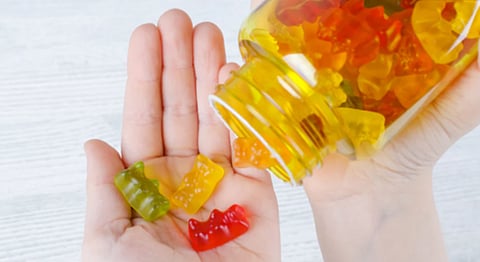Why Have Delta 9 Gummies Become So Popular?
Delta-9 THC gummies have rapidly become one of the most talked-about cannabis products in recent years. While THC has been known for decades as the psychoactive component of cannabis, the shift toward gummies signals a larger cultural and commercial transformation. These edibles are no longer just novelty treats; they represent a new way people are approaching cannabis for relaxation, wellness, recreation, and even sleep support. Their popularity did not emerge overnight; it is the result of changes in legislation, product innovation, consumer preferences, and evolving attitudes toward cannabis.
One of the biggest drivers of Delta 9 gummies' popularity is legal accessibility. In many regions, hemp-derived Delta-9 THC is legal as long as it stays below a specific concentration by dry weight. This opened a pathway for manufacturers to create gummies that comply with federal regulations while still delivering noticeable psychoactive effects. For many consumers, this meant access to THC in places where traditional cannabis products were either restricted or unavailable. In short, gummies offered a legal loophole that made THC more accessible to a broader audience.
Convenience also plays a significant role. Delta-9 gummies are easy to carry, discreet, and require no tools, smoke, or vapor. Not everyone wants to smoke or use a vape, especially those with respiratory concerns or those who prefer a more controlled, predictable experience. Gummies allow individuals to consume THC without drawing attention, making them appealing for people who want subtlety. They fit easily into everyday life: someone can take a gummy before bed, during a quiet evening at home, or while socializing in a relaxed setting.
The pre-dosed format is another factor driving demand. With smoking or vaping, it can be hard to gauge how much THC is being consumed, especially for beginners. Gummies, however, come in precise milligram amounts, allowing users to control their experience more confidently. This level of predictability makes Delta-9 gummies especially attractive to new users or those who are sensitive to THC. By adjusting milligrams slowly, individuals can find their comfort level without trial-and-error guesswork.
Taste is also part of the appeal. Delta-9 gummies are often formulated with fruit flavors, sour coatings, or candy-like textures, making them enjoyable to consume. This is a far cry from the bitter flavor of cannabis tinctures or the harshness of smoke. The pleasant taste lowers the psychological barrier of use, making gummies feel approachable and familiar. The product feels less like "taking a drug" and more like having a small treat—though the effects are very real.
Another reason for the surge in popularity is the long-lasting nature of edibles. When THC is ingested, it is processed through the digestive system and liver, where it converts into a compound called 11-hydroxy-THC. This metabolite produces a stronger and more sustained effect compared to inhaled THC. As a result, many people experience edibles as more relaxing, immersive, and steady. For those seeking relief from stress, sleeplessness, or chronic discomfort, the drawn-out effect of a Delta-9 gummy can be more beneficial than the quick rise and fall of smoking.
There is also an emerging wellness culture around THC, where people use it not just for recreation but also for emotional and mental recovery. While Delta-9 THC is psychoactive, many consumers use small or moderate doses to unwind after a long day, reduce anxiety in social settings, enhance creativity, or assist with sleep. Microdosing, taking minimal amounts to achieve subtle mood enhancement, is now more common than heavy recreational use. Gummies make this easy because each unit contains a known dose.
Social acceptance of cannabis has shifted significantly in recent years. What was once stigmatized is now widely discussed in mainstream media, wellness communities, and even in some clinical environments where THC is being studied for therapeutic potential. Celebrities, athletes, and influencers have also helped normalize its use. Delta-9 gummies have benefited from this cultural shift; they are non-intimidating, easy to understand, and align with the current wave of self-care and stress-management lifestyle trends.
Quality and variety have improved as well. Early cannabis edibles were notorious for inconsistent potency. Today, many brands use lab testing, controlled extraction processes, and consistent dosing. High-quality manufacturers offer clear labeling, third-party lab reports, and detailed ingredient information. Gummies now come in a wide range of dosages, flavors, and cannabinoid blends. Some are formulated with minor cannabinoids like CBG or CBN for targeted effects such as mood elevation or sleep enhancement.
Finally, personal experience and word of mouth have fueled the trend. Many people who try Delta-9 gummies report more profound relaxation, easier sleep, enhanced mood, or a pleasant sense of ease. When real-world experience aligns with expectation, adoption grows. Positive testimonials from friends, coworkers, and online reviews carry significant weight. As more consumers try gummies and share their experiences, demand continues to grow.
In summary, Delta-9 gummies have become popular because they are legal in many places, convenient, discreet, precisely dosed, flavorful, and long-lasting, and because they fit neatly into modern wellness culture. Whether used for mood support, relaxation, sleep enhancement, or recreation, these gummies offer a controlled, predictable, and enjoyable THC experience that appeals to both newcomers and long-time cannabis users. Their rise reflects not just a trend in product form, but a broader shift in how society views cannabis as part of personal wellbeing and everyday life.
Inspired by what you read?
Get more stories like this—plus exclusive guides and resident recommendations—delivered to your inbox. Subscribe to our exclusive newsletter
Resident may include affiliate links or sponsored content in our features. These partnerships support our publication and allow us to continue sharing stories and recommendations with our readers.

